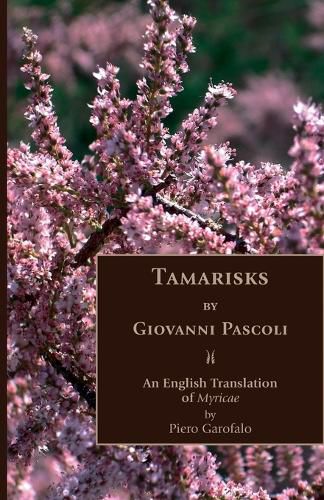Readings Newsletter
Become a Readings Member to make your shopping experience even easier.
Sign in or sign up for free!
You’re not far away from qualifying for FREE standard shipping within Australia
You’ve qualified for FREE standard shipping within Australia
The cart is loading…






This title is printed to order. This book may have been self-published. If so, we cannot guarantee the quality of the content. In the main most books will have gone through the editing process however some may not. We therefore suggest that you be aware of this before ordering this book. If in doubt check either the author or publisher’s details as we are unable to accept any returns unless they are faulty. Please contact us if you have any questions.
Tamarisks (Myricae) is Giovanni Pascoli's first major collection of verse. Many of its poems center on manifestations of the rural. Nature is at once an interpretation and interpolation of humanity. These compositions explore the countryside, experience the seasons and their alternation, relate the rhythms of agrarian labor, seek the blooming flower, spy the secluded nest. The collection draws on everyday objects, the changing landscape, the Anthropocene, the disenfranchised, and the natural world to explore humanity's relationship to nature and to the modern world.
The first edition of Tamarisks appeared in 1891 and consisted of twenty-two poems. Pascoli revisited and reviewed the collection over the course of twenty years. The fifth edition, published in 1900, included 156 poems and established the collection's definitive structure. The ninth and final edition appeared in 1911, the year before Pascoli's death.
Tamarisks is a liminal text, rooted in the classical lyrical tradition. It heralded the innovations and experimentation of the avant-garde of the early twentieth century. In breaking with the past and articulating a new poetic language, it is a foundational statement for modern Italian poetry.
Tamarisks' poems and sections develop an internal dialogue that reflects the mediation between the poetic voice and external reality. Pascoli's poetry is a single vast meditation that explores possibilities by engaging in diverse poetic strategies contemporaneously. The lowly tamarisk, at once humble and noble, is always poetry.
"One of the greatest poets of all times." - Seamus Heaney
$9.00 standard shipping within Australia
FREE standard shipping within Australia for orders over $100.00
Express & International shipping calculated at checkout
This title is printed to order. This book may have been self-published. If so, we cannot guarantee the quality of the content. In the main most books will have gone through the editing process however some may not. We therefore suggest that you be aware of this before ordering this book. If in doubt check either the author or publisher’s details as we are unable to accept any returns unless they are faulty. Please contact us if you have any questions.
Tamarisks (Myricae) is Giovanni Pascoli's first major collection of verse. Many of its poems center on manifestations of the rural. Nature is at once an interpretation and interpolation of humanity. These compositions explore the countryside, experience the seasons and their alternation, relate the rhythms of agrarian labor, seek the blooming flower, spy the secluded nest. The collection draws on everyday objects, the changing landscape, the Anthropocene, the disenfranchised, and the natural world to explore humanity's relationship to nature and to the modern world.
The first edition of Tamarisks appeared in 1891 and consisted of twenty-two poems. Pascoli revisited and reviewed the collection over the course of twenty years. The fifth edition, published in 1900, included 156 poems and established the collection's definitive structure. The ninth and final edition appeared in 1911, the year before Pascoli's death.
Tamarisks is a liminal text, rooted in the classical lyrical tradition. It heralded the innovations and experimentation of the avant-garde of the early twentieth century. In breaking with the past and articulating a new poetic language, it is a foundational statement for modern Italian poetry.
Tamarisks' poems and sections develop an internal dialogue that reflects the mediation between the poetic voice and external reality. Pascoli's poetry is a single vast meditation that explores possibilities by engaging in diverse poetic strategies contemporaneously. The lowly tamarisk, at once humble and noble, is always poetry.
"One of the greatest poets of all times." - Seamus Heaney